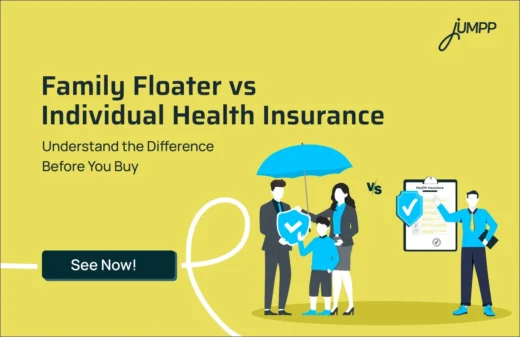What is Insurance? Basics, Types & Benefits

What if your scooter gets stolen tomorrow, or a sudden medical emergency hits unexpectedly? Insurance is a financial safety plan that helps you cover such unforeseen situations. It is essential because it protects you against financial loss from unexpected events like accidents, illnesses, or natural disasters.
Let us walk you through the insurance fundamentals and the key components of insurance policy you should know before buying one.
What is Insurance?
Insurance is a financial product designed to protect you from financial loss. It’s an agreement between you (the insured) and the insurance company (the insurer).
You pay a regular amount, called a ‘premium,’ and in return, the insurer promises to cover the financial costs of unexpected events. The extent of coverage depends on the terms of your policy and the sum insured.
Why is Insurance Important?
It is important because it protects your finances and your mental well-being. It ensures that sudden emergencies, like accidents, illnesses, or theft, do not become a heavy financial burden on you or your family.
Examples of How Insurance Works
Let’s say you’ve just bought a car for ₹5 lakh, and you’re worried about accidents. You take out motor insurance with a ₹5000 yearly premium. One day, someone crashes into your car. Instead of paying ₹50,000 out of your own pocket for repairs, your insurance covers the cost, saving you from financial strain.
Protect what matters most— explore insurance plans with the best savings app in India.
How Do Insurance Policies Work?
This is how the insurance process works-
- You pay a regular premium to the insurance company.
- The insurance company covers your financial losses.
- The policy defines the terms, coverage limits, and exclusions.
Do you know?
Premiums are often lower than expected because risk is pooled across many policyholders.
The Basic Components of Insurance Policy You Must Know
- Policyholder: This is you – the person buying the insurance.
- Premium: This is the regular amount you pay to the insurance company to keep your policy active.
For example, a healthy 25-year-old might pay a much lower premium for life insurance than someone aged 55 with a health condition.
- Sum Assured meaning: This is the amount the insurance company promises to pay you or your family if something happens.
For example, if you choose a life insurance policy with ₹5 lakh as the sum assured, your family will receive ₹5 lakh if you are no longer there to take care of them.
- Premium Payment Term: This refers to the time period over which you agree to pay your premiums. It could match the length of your policy or be shorter.
- Policy Term: The policy term is the period during which your insurance is active and provides coverage.
- Deductibles: These apply to general insurance plans like health or motor insurance. This is the amount you pay out of your pocket before the insurer covers the rest.
Note: Life insurance policies don’t have deductibles.
- Exclusions: These are things that are not covered by your insurance. For instance, many health insurance policies don’t cover certain pre-existing illnesses in the first year.
What are the Various Types of Insurance
There are different types of insurance available for different aspects of your life!
Types of Insurance: Choose the Right Protection
- Term Insurance
- TROP (Return of Premium)
- Whole Life Insurance
- ULIP (Unit Linked Insurance Plan)
- Money-Back Policy
- Endowment Plan
- Child Plan
- Retirement Plan
General Insurance
- Health Insurance
- Auto Insurance
- Home Insurance
- Travel Insurance
- Mobile & Laptop Insurance
- Pet Insurance
Let us understand the main types of insurance so that you can choose the right cover for life, health, or property
1. What is Life Insurance
Life insurance provides financial protection to your beneficiaries in the event of your death. The insurer pays a lump sum, called the death benefit, in exchange for the premiums you pay. Here are multiple types of life insurance policies in India.
- Term Life Insurance: It covers a specific period. Herein, the payout occurs only if the insured dies during the term.
- Whole Life Insurance: This provides coverage for your life and includes a savings component that builds cash value.
- Endowment Plans: This plan pays a lump sum either on maturity or on the policyholder’s death, whichever comes first.
- Unit-Linked Insurance Plans (ULIPs): These combine insurance coverage with market-linked investments.
- Child Plans: The plans secure a child’s financial future with payouts at key milestones of their lives.
- Pension Plans: They provide a regular income after retirement.
2. What is General Insurance
General insurance is a way to protect yourself and your belongings from unexpected events. It helps cover the costs, including medical bills, car repairs, or home damage.
- Health Insurance- This covers medical and surgical expenses due to illness or injury, ensuring you and your family are financially protected. Policies can include individual, family floater, critical illness, and senior citizen plans.
- Travel Insurance- This protects against medical emergencies, lost baggage, or travel delays during domestic or international trips. Policies include individual, family, student, and senior citizen travel insurance.
- Home Insurance- It protects your home from natural disasters, theft, or accidents.
- Pet Insurance- It helps cover veterinary expenses for illnesses, accidents, or routine care for your pets.
- Motor Insurance- This insurance plan protects vehicles like cars and two-wheelers against accidents, theft, or third-party liabilities. Policies can include comprehensive, third-party, and own-damage coverage.
- Mobile Insurance- This safeguards your smartphone against accidental damage or theft. Policies are affordable and cover both new and old devices.
- Other General Insurance- Other types include personal accident, shopkeeper, corporate, fire, and crop insurance. These policies provide protection against specific risks in personal and business contexts.
Functions of Insurance
The main function of insurance is to manage risk. It’s all about protecting yourself from the unexpected.
- Risk Transfer– Insurance helps you shift the financial burden of unexpected events to the insurance company.
- Financial Protection – It helps you avoid a financial crisis.
- Investment Support (ULIPs)– Some insurance policies, like unit-linked insurance plans (ULIPs), also work as investment tools. You can invest a portion of your premium in the market and grow your wealth while staying insured.
Still thinking about the right time to buy your insurance?
Don’t leave your finances to chance—learn about the benefits of insurance now!
Benefits of Insurance
The benefits of insurance are clear, especially when you understand how it works. It’s not just about protection – it’s also about financial planning.
- Financial Security for Your Family: If something happens to you, life insurance ensures your family is taken care of.
- Affordability: Health insurance makes healthcare affordable by covering medical expenses.
- Protection for Property: With home insurance, your house and its contents are protected against damage from accidents, theft, or disasters.
- Tax Benefits: Many insurance policies come with tax advantages. For instance, premiums paid for life insurance or health insurance can be deducted from your taxable income.
Getting familiar with insurance basic knowledge is the first step for everyone.
What Are the Tax Benefits of Insurance?
Insurance doesn’t just offer security—it also helps you save on taxes!
- Life Insurance:
- Premiums up to ₹1.5 lakh qualify for tax deductions under Section 80C.
- Health Insurance:
- Premiums up to ₹25,000 for yourself and your family.
- Additional ₹25,000 for your parents under Section 80D.
You must claim these benefits while e-filing your income tax returns to reduce your tax burden effortlessly!
Thinking about your family’s future? Start today!
Conclusion
Insurance is about security – security for you, your family, and your assets. Understanding the basics of insurance is the first step in building that security.
From health insurance to life insurance, it’s all about making sure that you’re financially prepared. By understanding insurance fundamentals and the different types of coverage, you can choose the right policy.
So, start exploring your insurance options today.
FAQs: Insurance Basics You Must Know
Insurance is a way to protect yourself from financial loss. You pay a small amount regularly, and in return, the insurance company helps you financially.
The 7 principles of insurance include Utmost Good Faith, Insurable Interest, Risk Pooling, Indemnity, Subrogation, Contribution, and Loss Minimization.
Insurance is important because it helps you manage risks and unexpected expenses. It provides financial protection, so you don’t have to worry about huge costs.
The main purpose of insurance is to protect you financially when unexpected circumstances arise.
Life insurance doesn’t cover deaths caused by war, terrorism, criminal acts, or suicide within the first few years. It also excludes high-risk activities.
Health insurance does not cover pre-existing conditions, self-inflicted injuries, or treatments for diseases like HIV, pregnancy, or infertility. In some cases, alternative therapies and cosmetic treatments are also usually excluded.
Motor insurance doesn’t cover damage from wear and tear, driving under the influence of drugs or alcohol, or without a valid license.
Life Insurance provides financial protection to your family in case of the policyholder’s death, often with savings or investment benefits. General Insurance covers financial losses from specific events like accidents, health issues, theft, or property damage.






